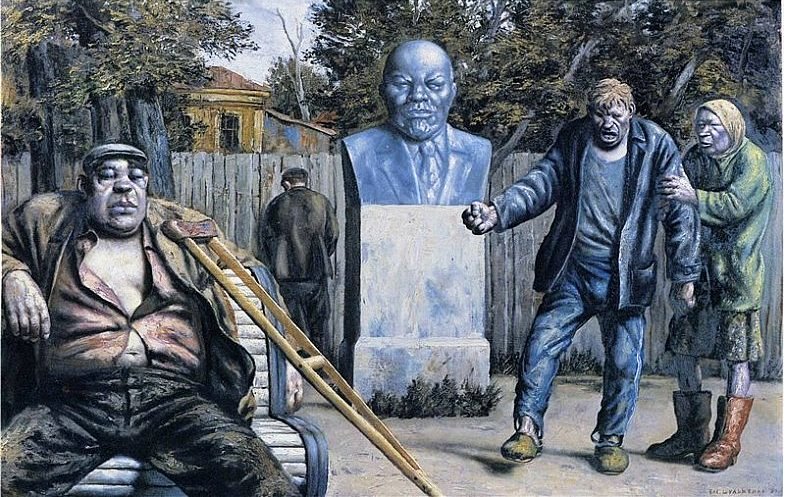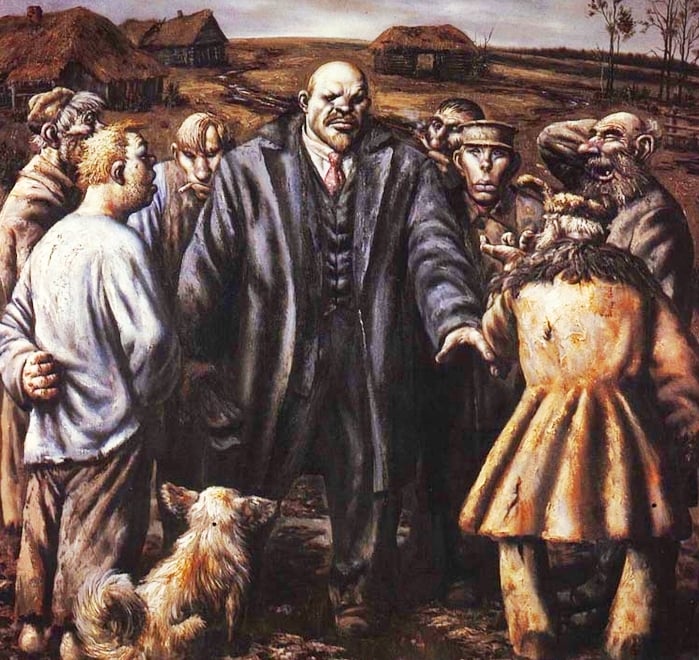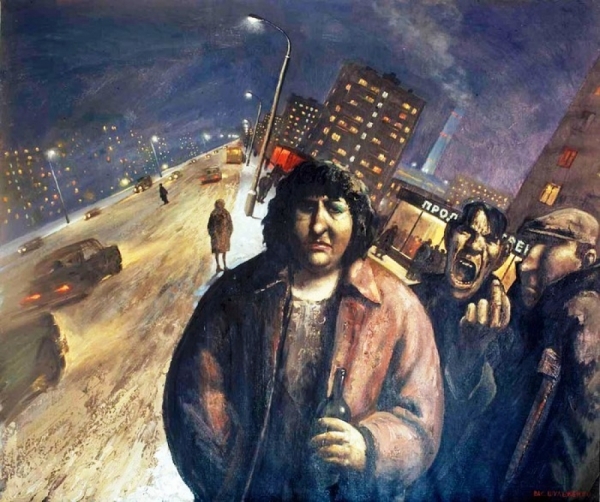When a famous hunter Jim Corbett hunted down and shot the man-eating tigress that terrorized India and Nepal for years, killing over 430 people, the entire region let out a collective breath of relief. When death of another, bigger man-eating beast was confirmed on the 26th of December of 1991, people all over the world cheered and celebrated. However, forensic experts’ verdict turned out to be premature. Despite rotting and poisoning everything around it with miasma for over 20 years, not only did the beast manage to reanimate, but also to grow its claws and teeth back. Now everyone in the beast’s vicinity is starting to yet again feel their putrescent grasp, Zura Amiranashvili writes in his blog for Georgian Journal.
The history of Russia is a difficult and tumultuous one, and it has left a deep, almost indelible imprint on its people and their mentality. Internal struggles between feudal lords and city-states in which thousands of peasants died, centuries of Mongol yoke, a corpulent empire that resulted in the displacement and genocide of many indigenous peoples and finally several decades of communism that brought death and misery to millions. Over a thousand years of overlords, despots, tyrants and dictators, not to mention a long-lived practice of serfdom – Russians could be pitied for what they had endured, if only they learned from their own experience and mistakes.
A modern Russian is a truly wretched thing; born into misery, he simply cannot comprehend a different life: a life without constant fear and mistrust of others, without every day being a battle for survival in a dog-eat-dog world. A life where a man lives instead of merely existing is beyond a modern Russian’s understanding and completely alien to him, just as is striving for it. This is what gives birth to Russians’ loathing towards everything that is better, higher or purer than them.
What does a savage do when he sees something he can never achieve, replicate or possess? He tries to destroy it. Just like Persians who smashed Greek statues or Arabs who burned the Library of Alexandria, Russians start seething with toxic envy at the sight of people living in clean and safe environments, exercising personal rights and generally enjoying themselves. A normal person’s reaction to such sights would be admiration and a desire to achieve the same. A Russian, however, either reacts with hatred and desire to destroy the “self-indulging libertines” or starts making excuses and snide comments such as “they stole all their wealth from someone” or “they do not deserve it” to alleviate his envy. There is nothing wrong with a successful society reaping fruit of its efforts, but an almost-genetic imprint of constant subservience and suffering has led Russians to believe that a high quality of life can only be achieved through domination of others and affluence can only be gained by dishonesty and swindling. Seeing good living conditions and wealth available to an ordinary, run-of-the-mill person is as bewildering and enraging to a Russian as a red cape to a bull.

This psychological phenomenon, in turn, becomes a fertile breeding ground for other toxic mental abnormalities, such as crab mentality: any Russian who tries to improve his living conditions, financial state or simply declares his intent to leave the country for a better life will face ridicule, contempt and even open aggression from his peers. He will be branded a traitor, a turncoat, a weakling and a coward – all this simply for no longer wanting to wallow in misery and filth. The same goes for any who try to improve their surroundings by coming up with new ideas, initiatives and incentives. Immediately they will be bombarded with questions like “what are you, the cleverest of us all?” or “we lived fine without that, why do you care?” or demotivating remarks such as “whatever you made will get wrecked soon” or “it won’t last long anyway”. Russians don’t trust any common man, including themselves, to improve anything in their lives – this is most likely due to their history, where everything came “from above”, which also explains their blind trust and obedience to any superiors, especially their government.
It hardly comes as a surprise that a society so disgruntled, fractured and rife with mistrust is easily rounded up and whipped into submission by any despot that comes around. What is surprising, however, is that Stockholm syndrome doesn’t even begin to describe servility of Russians towards those who rule them with an iron fist – the bloodier the rule, the greater the servility. It is both sickening and amusing to see more-or-less permissive and liberal rulers of Russia described as weak and limp-wristed in Russian history books, while bloodthirsty despots such as Ivan the Terrible, Alexander II, Lenin and especially Stalin are described as successful, heroic and even benevolent.
Communist rule, the zenith of dictatorship and tyranny, masterfully manipulated Russian national character, pitting people against each other in hopes of gaining even a modicum of power. Children spied on parents, husbands reported their wives, sisters eavesdropped on brothers and neighbors had no qualms with sending each other to Siberia if it meant getting rewarded with the unlucky fellow’s apartment. Snitching was openly encouraged; however, a snitch would inevitably join his victims in the camps once he outlived his usefulness. The same tortured hierarchy existed in higher echelons of the Soviet states, with political enemies plotting against each other mercilessly while groveling before their superiors in hopes of gaining a promotion for helping to oust “enemies of the state”. Several decades later this system became so imprinted into Russians’ minds that now they cannot imagine a life without fear, wealth without theft or power without backstabbing. If someone enjoys his life, he must be someone’s bootlick; if someone is wealthy, he stole it from someone; if someone is powerful, he cut all throats on his way up.
But communist puppetry didn’t end at this. Playing on unquenchable Russian envy of the more successful and more prosperous, they created a massive rift between their bloated state and the West, giving birth to an “us vs. them” mentality. Russians were brainwashed day and night to believe that the West was nothing but corrupt hedonism and debauchery bound to destroy their chaste, pure and beautiful paradise on Earth. This attitude was brought to a culmination in 1945, when hordes of Russian soldiers marched through the wrecked city of Berlin. What they celebrated, however, was not a victory in a war – it was a victory over the West and everything it represented, everything they were trained to hate. Akin to a street thug managing to spit in the face of an upper-class gentleman, Russians went out of their way to deify this event, to enshrine it as a pillar of their collective consciousness. To this day, they drink themselves into a stupor and howl about their victory over “fascism”.
This is where the most interesting part comes in. Russians never miss a chance to talk about how they “liberated the world from hatred and fascism”, yet extreme xenophobia thoroughly permeates their mentality. It is not widely known, but Russians are the only people in the world to have a slur for almost every single ethnicity that has or had the misfortune of encountering them. However, a vestigial desire of group belonging remains, leading to hypocrisy and doublethink so twisted that it would make Talleyrand cringe. The term “brotherly people” is thrown by Russians left and right, but in reality the term is completely hollow. A person who grew up in an atmosphere of mistrust and hatred towards the fellow man coupled with slave-master relations cannot comprehend brotherhood, let alone friendship. A perfect illustration of Russian friendship is an episode from Dostoevsky’s “Idiot” that describes a peasant slitting his old friend’s throat to steal his new silver pocket watch, but not before crossing his chest and asking for God’s forgiveness. Unfortunately, many of Russia’s neighboring nations were too late to realize that Russian definition of “brother” implies something akin to a person suffering from Down syndrome that one can push around at will and make him the butt of every joke, while he will only smile innocently in return. So far this definition applies to Belarusians, Kazakhs, Uzbeks and several other Central Asian nations that didn’t throw off the Russian yoke after USSR started collapsing. To nations that tried and succeeded in this, such as Lithuania, Azerbaijan and Georgia, Soviet Union left “parting gifts” such as the Medininkai Massacre, Black January and the April 9 Massacre – to mark and reaffirm the “brotherhood”, no doubt.

Nowadays, we have come full circle. Soviet Union is dead, but its poisonous cause and brutal ways live on in its ideological and spiritual successor. No longer satisfied with merely influencing its former subjects, Russia has decided to adopt a tactic of destabilizing and eventually annexing them through creation of “naturally emerging” breakaway states and their subsequent integration into Russia’s fold. First it happened in Moldova, then in Georgia and now it is Ukraine’s turn. Amusingly, despite Russia positioning itself as noble and honorable, its methods are cowardly and underhanded to the extreme: troops without identification signs, false flag operations, paid stooges and fervent denial of any involvement. It is hard to tell whether Putin and Co. are naïve to the point of believing that no one can see the elephant in the room or they simply do not care as long as their plans come to fruition.
What Russia is doing now cannot be classified even as irredentism – it is some sort of viral imperialism that Putin’s supporters proclaim to be “historical justice for Russia”. It is not clarified what exactly the Russians want justice for, since their misery is mostly self-inflicted, but it is clear what they want as compensation – land, the more the better. Many of Putin’s supporters claim that not only former Soviet lands should be made part of Russia as well, but that the “Russian World” should stretch as far as La Manche. Such sentiments are generously fertilized and fostered by Russian propaganda, which is relentlessly positioning Russia as a stronghold of everything good and pure, which is under siege of degenerate and depraved West. Sounds familiar, doesn’t it?
This propaganda has been so successful at twisting minds and dragging deep-seated grudges to the surface that hatred consuming today’s average Russian would make Tojo Hideki blush. Delving into such a person’s mind reveals many things, as entertaining as they are horrifying. For example, the notion of the entire post-Soviet space consisting of non-countries populated by non-ethnicities that speak non-languages, who lived on trees until the noble Russians came and brought them civilization and culture. Or that all crimes against humanity committed by Russians and Soviets in any time period are fictions invented by the subversive West; and if a crime (such as Katyn Massacre) is undeniably proven, then it was done for a reason and the victims deserved it. An idea of everyone in the West being shallow and soulless as opposed to deeply spiritual and magnanimous Russians is also noteworthy. Muslim terrorism in Europe and America is a great thing in the mind of an average Russian, because it “brings down the pillars of corrupt Western society”. Many Russians talk about Pan-Slavism and Slavic unity while declaring (sometimes right afterwards) that Poles, Czechs, Croats and especially Ukrainians should be exterminated for “selling themselves to the West”.
All of the above is coupled with Russians’ completely sincere surprise and indignation at the fact that their neighboring countries have decided to seek their fortune elsewhere, preferably as far away from the “Russian World” as possible. Just as in the case described above, they are branded traitors and backstabbers, simply for not wanting to have anything to do with Russia and what it represents. Still I cannot help but ask: how can a desire to improve one’s quality of life be treacherous? Who is betrayed by this? Russians’ constant striving to spread ruin, chaos and the alcoholic depression they dwell in is driven by an almost elemental desire to bring everyone else down to their level. Protecting oneself from all these things is as natural as taking cover up during a rain storm; only a mind as warped as that of a Russian can interpret such an action as a stab in the back.
It is not known what exactly can be done to curb the menace to global safety that Russia insists on being. Economic sanctions are only a partial solution and they do not have much of a chance to bring about the collapse of Putin’s regime and fix the toxic Russian mentality. Although it might be hard for a Westerner to properly gauge the danger Russia represents, since distance creates the illusion of safety, it is more than enough to know that as long as this geopolitical cancer is allowed to grow and metastasize, there will never be anything resembling peace in the region.
By Zura Amiranashvili, Georgian Journal.
Pictures by Vasily Shulzhenko





